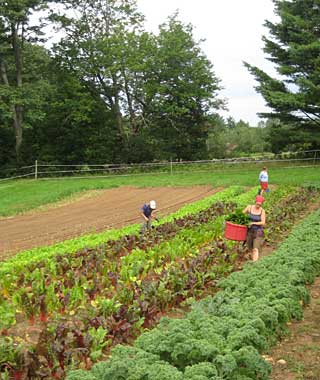 |
| Jon Stewart explained the ludicrous Monsanto Protection Act. |
We're going to run the US Food Supply gamut today. But it's long overdue!
Every week it seems, for the past few months, there has been a GMO-related development hit the news wire. With each and every story, I fully intended to give it attention, and write a blog focused around it. But it's in-depth, involved stuff that takes time to get a hold of. So weeks passed, and the the stories mounted.
Just now, in the past few weeks, there have been significant developments, in the battle for GMO labeling, the expired Farm Bill, and Americans' (and the world's) growing disgust for the Big Ag super-power Monsanto.
I'm going to touch on a lot of areas; hopefully spread the word, clarify any confusion (yours and mine), and encourage conversation.
- First up, the passage of the 'Monsanto Protection Act'.
 |
| March Against Monsanto in Melbourne. |
Prior to the law's passage, because of potential lawsuits (and I would hope public safety), biotech companies had to get permission from the US Department of Agriculture to plant new genetically engineered crops.
Now, with the Monsanto Protection Act in play, the USDA is required to allow the planting of new genetically engineered crops while the agency conducts further review.
Unfortunately, once the seeds are planted, it's a little difficult to undo any harm that my be discovered after the fact. And once a law has been set, a precedent has been set as well.
Once the public was made aware of what had really transpired, there was quite an outcry. Imagine, it's like saying, 'go ahead and put those potentially dangerous food additives on the market while we keep studying them to see if they make people sick'. (We kind of already do that, but that's another story.)
Rightfully so, the people were mad.
Now, there is an attempt to repeal the Monsanto Protection Act. Oregon Senator Jeff Merkley has introduced an amendment to the Farm Bill (which will be discussed further down the page) that would completely repeal the biotech industry's free pass. Sen. Merkley will be introducing the amendment to Congress in the coming week.
Sign the petition to communicate your disapproval of the loophole here.
- Second up, GMO Labeling Wins and Failures.
The problem with GMOs in the US, is that they're unidentifiable. Because of uncertainties about safety, GMOs are required to be labeled, or banned, in 64 countries throughout the world. Over the course of the last several months, a lot has happened regarding the US GMO labeling battle.
Of course, it was narrowly defeated in the November election in California (Prop 37). But GMO Labeling is becoming an ever-present debate. At the state level, over 65 bills have been introduced in 2013 regarding GMOs, and the majority of them about labeling. 20 states are working to get GMO labeling initiatives on their ballots.
Last week, the Connecticut Senate approved a GMO labeling bill, and is awaiting vote by the Connecticut House.
Senator Barbara Boxer and Representative Peter DeFazio have introduced a mandatory labeling law to be voted on as a part of the Farm Bill. The law would require food manufacturers to clearly label any product containing genetically engineered ingredients, or else the product would be classified as “misbranded” by the FDA.
 |
| March Against Monsanto in Las Vegas. |
Because of growing public opinion and demand, many Food Companies are Seeking non-GM Ingredients. Customers are asking for them, and they are trying to comply. But in the US, roughly 90% of corn, soybean, canola and sugar beet crops are grown from genetically engineered seeds. So you can imagine it is quite a challenge for companies seeking non-GM ingredients.
- Thirdly, The New Farm Bill is finally nearing a conclusion.
Here are six ways the Farm Bill affects us. It dictates:
- What kinds of food ends up on grocery store and food bank shelves
Right now, the House and the Senate are deciding the Farm Bill's future. Our food policies for the next 10 years are being decided.
As it stands today, there are several significant developments that could stem from the 2013 Farm Bill (including the GMO labeling vote discussed earlier): 1) huge cuts in food stamps for the poor, and 2) will end potentially expensive expansion of federally subsidized crop insurance.
Also worked into the Farm Bill is a preemptive attempt to take away individual state's rights: 'Monsanto Protection Act 2.0'. Inserted into the Farm Bill 2013, the 'King Amendment' -- introduced by Iowa Representative Steve King -- would revoke the ability of individual states to pass GMO labeling laws.
If passed, this could be the MOST IMPORTANT aspect of the Farm Bill.
The Monsantos of the world see the writing on the wall. With non-GMO campaigns gaining more and more popularity, and labeling laws becoming a familiar sights on election ballots throughout the country, it's just a matter of time before states begin passing their own GMO labeling laws.
Go here to voice your disapproval of the Monsanto Protection Act 2.0.
- Finally, the 'Oregon Monsanto Protection Act'.
These things make me confused, and frustrated to write about. But this is the system we have allowed to develop. It makes you wonder, why are these insanely rich biotech companies getting so many helping hands from our government?
If we want to make any changes, we have to be diligent and attentive to the policies our elected politicians (they work for us!) put in place. Although I'm growing tired of the constant petitions, I am thankful we have them. It allows us to voice our opinion to our senators and representatives. Sign them if you agree (Monsanto Protection Act 2.0 and Repeal the Monsanto Protection Act).
I know, it's a lot of information to digest. But stay informed and involved. We're making progress!
RELATED POSTS:
LINKS:
























